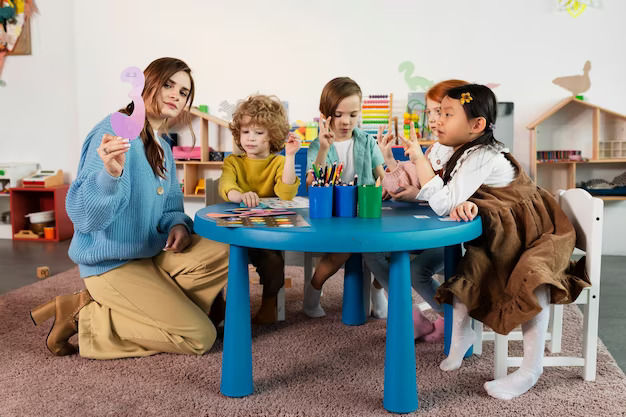Preschool education lays the foundation for a child's future academic success, and there is a growing recognition of the importance of incorporating Science, Technology, Engineering, and Math (STEM) concepts into early learning experiences. STEM education in preschool goes beyond traditional learning methods, fostering curiosity, problem-solving skills, and a love for exploration. In this article, we will explore the significant role that STEM education plays in preschool and its impact on a child's development.
1. Building a Foundation for Critical Thinking
STEM education in preschool introduces young minds to critical thinking and problem-solving skills. Engaging in activities that involve exploration and experimentation, such as simple science experiments or building structures with blocks, allows children to develop logical reasoning. These early experiences lay the groundwork for the analytical thinking skills that will serve them well in their academic journey and beyond.
2. Fostering Curiosity and a Love for Learning
Preschoolers are naturally curious, and STEM education harnesses that innate curiosity to instill a love for learning. Science experiments, nature exploration, and hands-on activities create an environment where children can ask questions, make observations, and seek answers. This curiosity-driven approach encourages a positive attitude towards learning, setting the stage for a lifelong pursuit of knowledge.
3. Introducing Real-world Applications
STEM education in preschool introduces children to real-world applications of concepts they encounter in their everyday lives. Whether it's understanding the science behind cooking in the kitchen or exploring the principles of balance and stability while building with blocks, these activities connect theoretical concepts to practical, tangible experiences. This hands-on approach helps children see the relevance of what they are learning.
4. Developing Early Math and Numeracy Skills
Mathematics is an integral part of STEM education, and introducing math concepts in preschool sets the stage for future mathematical understanding. Counting, sorting, pattern recognition, and other math-related activities are seamlessly integrated into play. These early encounters with math concepts contribute to the development of numeracy skills and a strong foundation in mathematical thinking.
5. Encouraging Teamwork and Collaboration
STEM activities often involve teamwork and collaboration, even in preschool settings. Building structures together, conducting simple experiments as a group, or solving problems collectively fosters social skills and teamwork. These collaborative experiences help children learn to communicate effectively, share ideas, and work towards a common goal—a crucial aspect of both academic and social development.
6. Nurturing a Diverse Skill Set
STEM education in preschool nurtures a diverse skill set that goes beyond traditional academic subjects. Children develop fine motor skills through activities like building and crafting, spatial reasoning through construction play, and communication skills through expressing their observations and ideas. This holistic approach ensures that children are well-rounded, equipped with a range of skills that extend beyond the STEM disciplines.
7. Bridging the Gender Gap in STEM
Early exposure to STEM in preschool can play a crucial role in bridging the gender gap in STEM fields. By providing equal opportunities for both boys and girls to engage in STEM activities, preschool education can break down stereotypes and instill a sense of confidence and competence in all children. This early exposure lays the groundwork for future inclusivity and diversity in STEM-related fields.
Related : The Benefits of Early Childhood Education: Why Preschool Matters

Choosing the Best Preschool for STEM Enrichment
Selecting the right preschool is crucial in ensuring your child receives the best STEM education. Look for institutions that prioritize hands-on learning experiences, incorporating STEM concepts seamlessly into their curriculum. The best preschools for STEM enrichment provide a well-rounded environment with dedicated spaces for science exploration, engineering play, and outdoor nature experiences. Inquire about the integration of technology, ensuring a balanced and age-appropriate approach. Additionally, consider the staff's training in STEM education and their commitment to fostering a love for learning. By choosing a preschool that prioritizes STEM, you are laying the groundwork for your child's academic success and fostering a lifelong curiosity for the world around them.
Montessori Shir-Hashirim Los Angeles
- 6047 Carlton Way, Los Angeles, CA 90028
- Highly rated for focused curriculum, excellent staff, and diverse extracurriculars
- Half day: $27,000 yearly, $9,000 quarterly
- Full day: $28,500 yearly, $9,500 quarterly
Shir-Hasirim Montessori school has two different locations. The main location is on Carlton Way in Los Angeles. This school teaches children between the ages of 2 and 6 and prepares them for some of the top Montessori elementary schools in the city. Specifically, they offer a primary program and a summer program for preschool children.
At Shir-Hashirim, they allow their students to grow and learn both individually and within the community of the school. Students are able to learn at their own pace when it comes to both practical life skills and subjects such as maths and language. Shir-Hashirim Montessori has a parent-and-me program that is best for families who may enrol their child in the Montessori program.
Conclusion :
In conclusion, STEM education in preschool is not just about preparing children for future careers in science or technology; it's about nurturing a holistic approach to learning. It's about fostering a love for exploration, encouraging critical thinking, and providing a strong foundation for future academic success. By recognizing the essential role of STEM education in preschool, educators and parents can collaborate to create an environment that unlocks the potential within each child, setting the stage for a lifelong journey of curiosity and discovery.


